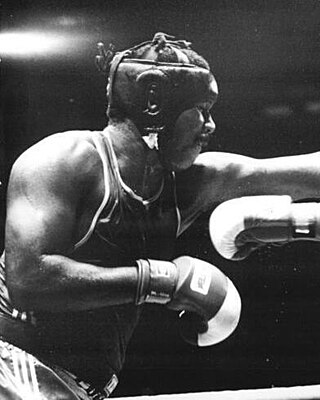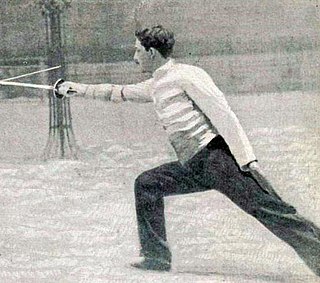
Teófilo Stevenson Lawrence was a Cuban amateur boxer who competed from 1966 to 1986.

The 1900 Summer Olympics, today officially known as the Games of the II Olympiad and also known as Paris 1900, were an international multi-sport event that took place in Paris, France, from 14 May to 28 October 1900. No opening or closing ceremonies were held.

At the 1900 Summer Olympics, seven fencing events were contested. 260 fencers from 19 nations competed. The events took place at the Tuileries Garden.

Félix Savón Fabre is a Cuban former amateur boxer who competed from 1980 to 2000. Considered one of the all-time greatest amateurs, he became three-time Olympic gold medalist, and the World Champion six times in a row, all in the heavyweight division. In 1988, when he was favored by many to win the gold medal at the 1988 Summer Olympics, the Cuban government boycotted the event. Savón is particularly known for having rejected numerous multimillion-dollar offers to defect and leave Cuba permanently to fight Mike Tyson as a professional.

Alvin Christian "Al" Kraenzlein was an American track-and-field athlete known as "the father of the modern hurdling technique". He was the first sportsman in the history of the Olympic games to win four individual gold medals in a single discipline at the 1900 Summer Olympics in Paris. As of 2016, Alvin Kraenzlein is the only track-and-field athlete who has won four individual titles at one Olympics. Kraenzlein is also known for developing a pioneering technique of straight-leg hurdling, which allowed him to set two world hurdle records. He is an Olympic Hall of Fame (1984) and National Track and Field Hall of Fame (1974) inductee.

Australia has sent athletes to every Summer Olympic Games, as well as every Winter Olympics except 1924–32 and 1948. In 1908 and 1912 Australia competed with New Zealand under the name Australasia.
Mario César Kindelán Mesa, best known as Mario Kindelán, is a Cuban former amateur boxer. He is a two-time Olympic gold medalist, having competed in the lightweight division at the 2000 and 2004 events and defeated world champion boxer Amir Khan to win Olympic gold in 2004. His cousin is baseball player Orestes Kindelán.

Baseball at the Summer Olympics unofficially debuted at the 1900 Summer Olympics in Paris, and was first contested as a demonstration sport at the 1912 Summer Olympics in Stockholm. It became an official Olympic sport at the 1992 Summer Olympics in Barcelona, then was played at each Olympiad through the 2008 Summer Olympics in Beijing. The sport was then dropped from the Summer Olympic program, until being revived for the 2020 Summer Olympics in Tokyo for a single appearance. It is next expected to be part of the 2028 Summer Olympics in Los Angeles.
Basketball at the 1992 Summer Olympics was the thirteenth appearance of the sport of basketball as an official Olympic medal event. It included the sport of basketball's men's and women's competitions of the 1992 Summer Olympics. The games were played at the Pavelló Olímpic de Badalona. 12 men's teams and 8 women's teams participated in the tournament.

Roberto Balado Méndez was a Cuban amateur boxer, who competed from 1986 to 1994. At the 1992 Summer Olympics he won a Gold medal in the men's super heavyweight (+91 kg).

The United States of America has sent athletes to every celebration of the modern Summer Olympic Games with the exception of the 1980 Summer Olympics, during which it led a boycott in protest of the Soviet invasion of Afghanistan. The United States Olympic & Paralympic Committee (USOPC) is the National Olympic Committee for the United States.

The United Kingdom has been represented at every modern Olympic Games. By end of the 2024 Summer Olympics, it is third in the all-time Summer Olympic medal table by overall number of medals, and fourth in number of gold medals won. London hosted the Summer Olympic Games in 1908, 1948 and 2012.

Spain first participated at the Olympic Games in 1900, and has sent athletes to compete in most Summer Olympic Games since 1920. Spain has also participated in every Winter Olympic Games since 1936. Its team is organised by the Spanish Olympic Committee created in 1924.

Cuba first participated at the Olympic Games in 1900, and has sent athletes to compete in 20 of 28 Summer Olympic Games overall.

The United States national baseball team, also known as Team USA represents the United States in international-level baseball competitions. The team is currently ranked 2nd in the world by the World Baseball Softball Confederation. The United States has won many international tournaments, many of which are now discontinued. Most notably the team won the Olympic baseball tournament in 2000, and the World Baseball Classic (WBC) in 2017.

Amateur boxing is the variant of boxing practiced in clubs and associations around the world, at the Olympic Games, Pan American Games and Commonwealth Games, as well as at the collegiate level.

Ramón Fonst Segundo was a Cuban fencer who competed in the early 20th century. He was one of the greatest world fencers, individual and by team; he was born and died in Havana.

The men's foil was a fencing event held as part of the fencing programme at the 1904 Summer Olympics. It was the third time the event was held at the Olympics. The competition was held on September 7, 1904. Nine fencers from three nations competed. The medals were swept by "Cuban" fencers; only Fonst was actually Cuban, but the other two men were marked as Cuban by the IOC despite being American. The mistake was corrected after more than 100 years in the early 2020s.

The épée event for amateurs was one of three épée events at the 1900 Summer Olympics. 102 fencers from 11 nations competed, with 91 of them from France. The event was won by Ramón Fonst of Cuba, the first of his two golds in individual épée. Silver and bronze both went to host nation fencers, Louis Perrée and Léon Sée. These badly organized games — derisively called “The Farcical Games” — were so poorly publicized that years later, even the competitors were clueless that they had competed in the Olympics in 1900. No official records for the games exist. These accomplishments are not even mentioned in the 1911 Encyclopædia Britannica. This was the first appearance of the event, as only foil and sabre events had been held at the first Games in 1896; the Men's épée event has been held at every Summer Olympics since 1900.

The amateurs-masters épée was an event at the 1900 Summer Olympics. It was held on 15 June at the Tuileries Garden. There were 8 competitors from two nations. The event was won by Albert Ayat of France. Ramón Fonst of Cuba took silver, while Léon Sée of France earned bronze.

















